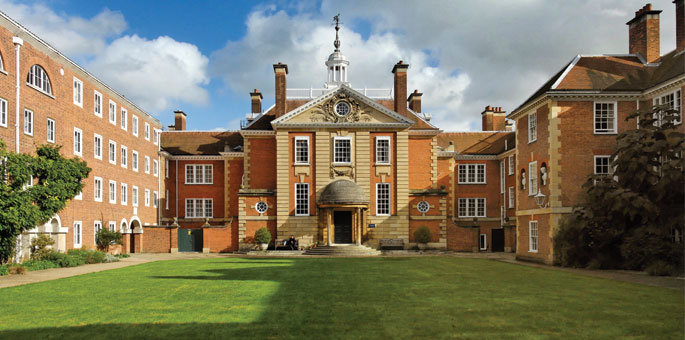It is one year on since Lady Margaret Hall, a college in Oxford University, launched its Foundation Year, a four-year pilot project to attract talented students with great academic potential who previously would not have considered applying to Oxford. The foundation year was modelled partly on Trinity’s Access Programme (TAP).
Director of TAP Cliona Hannon played an active role in the Lady Margaret Hall Foundation Year pilot project, offering the experience and knowledge that she has built over the past 18 years. Since 1997, approximately 1,000 young and mature students have successfully completed the TAP foundation year, with more than nine out of 10 of those students achieving a place on an undergraduate degree the next year. The Oxford foundation year shares many similarities with the TAP programme, including the way students are recruited, the interview process and its aims to create “university ready” students at the end of the year.
Yet there are some marked differences. For example, all students on the Lady Margaret Hall Foundation Year lived on campus during term time. Jo Begbie, the Foundation Year coordinator, told The University Times that they strongly encouraged this because their undergraduate students all generally live on campus and this would prepare the students for “real” Oxford life. Another fundamental difference between the TAP foundation year and the Lady Margaret Hall programme is that, from the outset, students specify what degree course they wish to study. While participating in the Lady Margaret Hall Foundation Year, students study a broader curriculum of subjects related to their specified degree, which addresses any gaps in understanding of A-Level work and therefore differs from the first-year undergraduate course.
This energy will undoubtedly have positive ripple effects throughout the Oxford college and the wider university. Increased diversity and the inclusiveness of academic talent, of course, enhances the learning environment as a whole.
Even with the help of TAP, and with Hannon based in Oxford one week per month throughout the academic year, the first year was still a learning curve for staff and students alike. Begbie, as the coordinator of the programme, worked closely with the students on the foundation year. One of the key pieces of feedback she received was that students wanted more teaching hours and class time, something which Begbie attributes to their “incredible energy and ambition”. This energy will undoubtedly have positive ripple effects throughout the Oxford college and the wider university. Increased diversity and the inclusiveness of academic talent, of course, enhances the learning environment as a whole.
In terms of lessons learned throughout the first Foundation Year, Begbie believes the students will benefit from a study skills module ahead of their coursework. During the first foundation year, study skills were built into their modules throughout the year. However, students’ feedback and experiences have shown that embedding these skills before the academic work begins will be more beneficial. Skills such as critical thinking form the basis of a university education, as Alan Rusbridger, former editor of the Guardian and Principal of Lady Margaret Hall, noted recently. In a blog post, Rusbridger said: “They don’t really teach you what to think but how to think, in the tutorials you get more understanding about how you think because you have to justify why you think something.”
The first 10 students recently graduated from the Lady Margaret Hall Foundation Year. Seven out of the ten will continue onto undergraduate degrees in Oxford to study a wide-ranging mix of degrees including maths, music, ancient history and law. Three of the students decided to continue their studies at other Russell Group universities. Rusbridger commented that the 10 students have “grown immeasurably since September”. Completion of the foundation year was a remarkable achievement in and of itself, as Rusbridger noted there were several sceptics who doubted that the first cohort or “the pioneers” would successfully integrate and complete the challenging year. Although there may have been sceptics, for the most part Rusbridger and Begbie seem to agree that the academic community within the college was very committed to the students on the foundation year. This sense of community between Lady Margaret Hall and the students on the foundation year has been a key part of the project so far, which is funded by alumni of the college.
Louise Richardson, the Vice-Chancellor of Oxford University, was among the first in her family to attend college, and has spoken frequently about the need to support “poor kids” in college.
Lady Margaret Hall is not alone in acknowledging that greater diversity is of benefit to the entire university. Throughout Oxford there are many projects and initiatives being tried and tested to increase the diversity of the student body. The UNIQ summer schools are a good example, offering a programme of free, live-in summer schools that provide “taster” courses that prioritise students from low socio-economic backgrounds or under-represented groups at Oxford. The students’ union recently launched a new campaign aptly named the “Class Act”, with a view to supporting underrepresented groups at Oxford by making connections and creating networks to alleviate the potential for new students to feel isolated or marginalised because of their social status. Louise Richardson, the Vice-Chancellor of Oxford University, was among the first in her family to attend college, and has spoken frequently about the need to support “poor kids” in college.
At a Widening Participation symposium held in Lady Margaret Hall recently, Richardson pointed to Oxford’s collegiate system as one that can successfully accommodate the trial of pilot projects in order to improve access.
It would appear from the variety of initiatives across the university that there is an appetite for change within Oxford. Students and staff alike want a more diverse and inclusive academic environment. Lady Margaret Hall has certainly created an opportunity for Oxford University to benefit from the wealth of talent that a wider variety of student voices can bring to the academic community.







